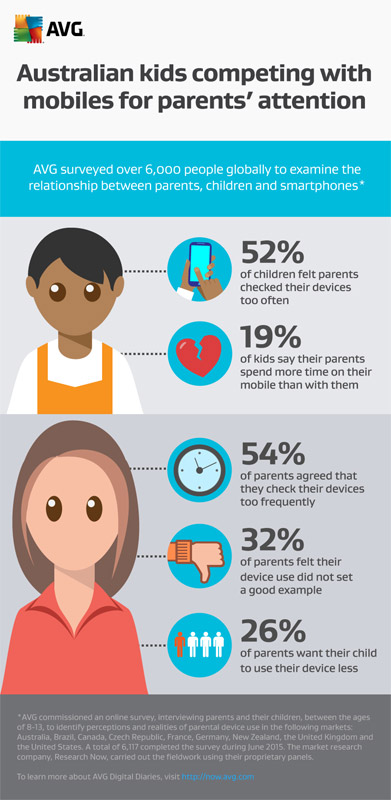Michael McKinnon Aussie Kids Competing with Mobile Phones for Parents' Attention Interview

Michael McKinnon Aussie Kids Competing with Mobile Phones for Parents' Attention Interview
Mobile phones are gaining an increasing share in the battle for parental attention, with a third of Aussie children (32 per cent), surveyed for a recent study, saying their parents spent equal or less time with them than on their devices. The research, conducted by AVG® Technologies N.V. (NYSE: AVG), the online security company™ for more than 200 million monthly active users, examined children's perceptions of their parents' mobile device use, and uncovered some worrying trends. The global study of 6,117 covered 335 Australian adults and 302 children.
Hinting at ongoing digital intrusion upon family life, just over half of the children questioned felt that their parents checked their devices too often (52 percent); and their biggest grievance, when given a list of possible bad device habits, was that their parents allowed themselves to be distracted by their device during conversations (37 percent) – something that made a quarter of the complainants feel unimportant (26 percent).
When asked about their device use, half of all parents agreed that it was too frequent (54 percent), and many also worried about how this looked to the younger generation. Almost a third (32 percent) felt that they didn't set a good example for their children with their device use.
'With our kids picking up mobile devices at an increasingly younger age, it is really important that we set good habits within the home, early on," said Michael McKinnon, Security Awareness Director at AVG Technologies. 'Children take their cues from us for everything else, so it is only natural that they should do the same with device use. It can be hard to step away from your device at home, but with a quarter of parents telling us that they wished their child used their device less (26 percent) they need to lead by example and consider how their behaviour might be making their child feel."
In a country by country comparison, Brazilian parents topped the survey for device use, with 87 percent of children stating their parents used mobile devices too much. More worryingly, 59 percent of Brazilian parents admitted to using the phone while driving – interestingly, 56 percent of children in Brazil also said they would confiscate a parent's device, if they could (39 per cent in Australia).
To view our video, please visit our YouTube channel.
Interview with Michael McKinnon
Question: What surprised you most from the results of AVG's latest Digital Diaries research?
Michael McKinnon: We asked both parents and children in this research who is checking or using their mobile device the most while at home.
Only 38% of the Children surveyed agreed they were the biggest users, with 49% of them nominating their parents as being the ones spending the most time on their devices. (The rest answered don't know, somewhat diplomatically)
At least the fact that Aussie parents are using their mobile devices more than their children was confirmed by the parents themselves, with 50% agreeing it was them, but 40% nominating their children as the biggest users.
The surprise was when we asked parents if they thought they are setting a good example with their mobile device usage - and 55% of Aussie parents think they are! Yet the rest of our research shows maybe this isn't entirely true as we discovered a litany of bad mobile habits that are affecting their children in real and tangible ways.
 Question: How are mobile phones disrupting family life?
Question: How are mobile phones disrupting family life?
Michael McKinnon: Distraction seems to be the number one issue at hand with mobile device usage, as demonstrated by our findings. As more and more of our daily living are organised and communicated using mobile devices, it seems our traditional view of family life is quickly evolving. Mobile devices in general have disrupted the way we communicate with each other using technology, such as social media and the anxiety of being constantly connected. This, in turn, is affecting the quality of our personal relationships, particularly with our children. It's important that we be good examples to our children, particularly instilling in them good habits that are going to keep them safe and secure both offline and online.
Question: What are some of the parents' worst habits with their phones?
Michael McKinnon: Parents' worst mobile habits, in order of their own self-admission of these was:
1. Getting distracted by your mobile while having a conversation (43%)
2. Using a mobile device while watching TV with your child (35%)
3. Using a mobile device while playing outside with your child (23%)
4. Using a mobile device at the dinner table during a meal (21%)
5. Using a mobile device while driving (18%)
6. Texting someone in the same house (12%)
7. Playing music, games or video loudly from mobile device (12%)
8. Using a mobile device while reading a story with your child (9%)
Question: What are the children's opinions about these phone habits?
Michael McKinnon: We asked the children how they felt about these bad habits and many of them responded indicating that they did not feel important when being ignored.
In the case of the parent being distracted when watching TV or playing outside, children lamented at the fact they thought their parents were 'missing out on a fun activity".
When it came to dinner time, children felt they were missing quality time together, and also disappointed at the hypocrisy of being told not to use their devices at the dinner table.
Parental mobile distraction at story time elicited the strongest response, although affecting 1 in 10 Aussie kids, with 41% indicating they would prefer to be spending quality time together.
Question: What advice do you have for parents and their families?
Michael McKinnon: There are some simple tricks and tips I think that many parents perhaps haven't even considered, including setting Do-Not-Disturb times on their mobile devices that can suppress when notifications and alerts appear.
Sometimes duplicate notifications are sent in email and also through mobile apps like Facebook, so disabling one of the two settings can in some cases reduce the number of unnecessary interruptions you'll have.
In summary, think about ways of pocketing those mobile devices and only removing them when absolutely necessary - or at designated times that your whole family agrees on.
Question: What do kids like most about mobile devices?
Michael McKinnon: Aussie kids liked the following activities when using their mobile devices and technology.
1. I enjoy the games and fun things I can do (61%)
2. I can talk to my friends and time I want (35%)
3. I can find information easily (34%)
4. There are always new things to do online so I never get bored (30%)
5. I can get in touch with my parents/family whenever I need (25%)
6. All my friends have mobile devices so I need to have one too (21%)
Michael McKinnon: Like any conversation in the home about using technology, or staying safe online, these are conversations that should never be out of bounds.
If someone is getting distracted easily, try to find encouraging ways to have them use some of the tips I provided easily to minimise some of those distractions, especially if they are caused by endless notifications and alerts.
I believe it really is up to all members in a family make sure they keep checks on each other, and to ensure that bad habits are not forming that could adversely affect their security and safety other offline or online.
Interview by Brooke Hunter
MORE



